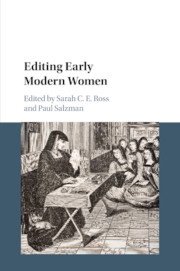Book contents
- Editing Early Modern Women
- Editing Early Modern Women
- Copyright page
- Contents
- Figures
- Contributors
- Book part
- Glossary
- Chapter 1 Introduction
- Part I Editorial Ideologies
- Part II Editing Female Forms
- Part III Out of the Archives, into the Classroom
- Part IV Editorial Possibilities
- Chapter 14 Editing Early Modern Women in the Digital Age
- Select Bibliography
- Index
Chapter 14 - Editing Early Modern Women in the Digital Age
from Part IV - Editorial Possibilities
Published online by Cambridge University Press: 05 August 2016
- Editing Early Modern Women
- Editing Early Modern Women
- Copyright page
- Contents
- Figures
- Contributors
- Book part
- Glossary
- Chapter 1 Introduction
- Part I Editorial Ideologies
- Part II Editing Female Forms
- Part III Out of the Archives, into the Classroom
- Part IV Editorial Possibilities
- Chapter 14 Editing Early Modern Women in the Digital Age
- Select Bibliography
- Index
Summary
- Type
- Chapter
- Information
- Editing Early Modern Women , pp. 255 - 269Publisher: Cambridge University PressPrint publication year: 2016
- 11
- Cited by

